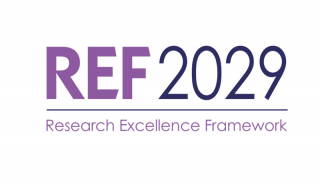
Breadcrumbs navigation
Research Directors’ Forum update: Navigating changes to UoA 19 and beyond
Our first Research Directors’ Forum of this academic year took place on 5 November 2025 and brought together research directors from across UK International Relations departments to discuss ongoing developments around REF 2029 and the future of research assessment in our field. The guest speaker, Professor Matthew Flinders (Chair of REF 2029 Sub-Panel 19: Politics and International Studies), offered an excellent insight into the latest REF updates, as well as reflections on how departments can prepare for this current cycle and start imagining disciplinary futures beyond 2029.
1. REF 2029 as a community endeavour
Professor Flinders opened by emphasising that the REF should be seen as a collective, community-wide endeavour. He addressed the current pause in REF 2029, announced on 4 September 2025, which is expected to last no more than three months. The pause, he explained, responds to extensive sector feedback and aims to streamline, simplify, and clarify the framework while ensuring alignment with broader government priorities for higher education. Crucially, he sought to underline that, despite the pause, considerable preparatory work continues within the main panels in view to ensuring that the REF takes place within the planned timeframe. In fact, a first informal meeting of Sub-Panel 19 has already taken place, allowing members to introduce themselves and begin shaping priorities. He also clarified distinctions between REF Central and Research England, noting that while Research England is developing projects on the future of research assessment, these are separate from the REF 2029 process. The sub-panel expects new proposals to be published early in the new year, with the rules hopefully becoming clear by Easter 2026. There is limited time for wide consultation, but the sector’s priority is now clarity rather than further deliberation.
The People, Culture and Environment (PCE) pilot was cited as particularly valuable in revealing the complexity of evaluating research culture, though its results will probably not be published until after the pause concludes. Each panel now includes specialists in equality, diversity and inclusion (EDI) and research culture, signalling a broader and more people-centred approach to assessment. Professor Flinders noted that this REF will be distinctive, reflecting the financial pressures and political priorities shaping the higher-education landscape. Its results, therefore, may have broader systemic and policy implications than previous cycles. Professor Flinders encouraged the Politics and International Relations communities to think beyond compliance—to position themselves proactively, demonstrating the disciplines’ societal relevance at a moment of profound global change.
2. Key issues and emerging questions
We discussed several specific aspects of the developing REF 2029 framework. Professor Flinders indicated that the direction of travel would please most people: the process is likely to feel more streamlined and familiar, albeit possibly with a slight re-weighting across categories and a stronger emphasis on people and culture. Although the PCE pilot reports have not yet been published, early indications suggest the dimension will remain integral.
The closure of output portability was highlighted as a major change: while short outputs (article, chapters) will now remain with the originating/ supporting institution, the treatment of long-form outputs (monographs, edited volumes) is still under discussion (with the possibility that long form outputs may be claimed by former institutions a few years following an employee’s departure). This shift places greater importance on institutional monitoring of staff following departure, as well as claims to outputs.
Questions around EDI and representativeness prompted discussion on how to ensure fair and balanced submissions. Unit of Assessment (UoA)19 is committed to embracing a broader and more pluralistic definition of research excellence. While traditional 4★ outputs—such as quantitative articles in leading journals—remain central, the next REF aims to provide a positive steer toward recognising diverse forms of research and creative outputs. Examples cited included photography, artwork, poetry, and other non-traditional contributions that reflect excellence in research by advancing knowledge and social understanding. Guidance on assessing such outputs will be developed during the criteria-setting phase.
Cross-referral was also discussed, particularly for scholars whose departments/schools have been restructured or merged, and where they are now being submitted to other UoAs. The sub-panel expects a considerable amount of cross-referral across units, supported by interdisciplinary experts to ensure robust and fair scoring.
3. Mobility and research culture
Mobility was also a central theme of our discussions, not only of staff, but of knowledge, ideas, and collaboration. At the heart of the PCE lies the question of how institutions foster an ecosystem-approach that supports the flow and absorption of different forms of knowledge. Participants discussed how to encourage innovative and disruptive forms of mobility - interdisciplinary work, cross-sector partnerships, and international collaboration. Professor Flinders also underlined the need to think about professional research support staff and ‘third space’ staff (i.e. knowledge mobilisers) as core elements of their wider definition of the research community.
The discussion concluded with a call for Research Directors and REF leads to reflect on how their internal review mechanisms operate, ensuring they do not inadvertently reproduce bias or narrow definitions of excellence. Professor Flinders underlined the importance of recognising public engagement as a dimension of impact - not merely as a communication exercise but as a substantive contribution to research quality and societal relevance.
4. Looking ahead
While uncertainties remain, the overall direction of REF 2029 was seen as positive - more inclusive, reflective, and open to diverse forms of scholarship. Participants agreed that Politics and International Relations disciplines must assert their relevance within the national research landscape, working collectively to showcase its vibrancy and societal importance. Professor Flinders underlined how he viewed the event as the beginning of a positive and long-term conversation with BISA and our members as we head to REF 2029. He also noted how significant it was to have Tessa Piper (Coventry University), the sub-panel’s secretary, present at the meeting to help inform and promote discussion about the REF.
We will continue to facilitate dialogue among Research Directors as new details emerge, ensuring the community remains informed and equipped to navigate the evolving research assessment environment.


